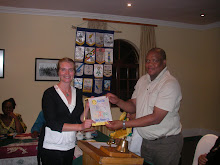Soul. That’s what this 26 year old Rotaracter says is his favorite part of being a Swazi. “You feel like you’ve known another Swazi forever… there’s just a connection, even if you’ve never met before,” he says.
Buyani- you’ve said it best. My first real introduction to the Rotaract club of Mbabane-Mbuluzi was on a three day retreat where I was the only non-African. By the end of the three days, it really was like we had known each other forever. The hospitality, warmth, and “soul” of the Swazi people are a main draw to the Kingdom.
Buyani Fakudza was one of the founders of the Rotaract club of Mbabane-Mbuluzi. Rotaract is like Rotary, but for young adults. Buyani’s first introduction to Rotaract was as a university student, where he majored in GEP (geography, environment, and planning). From his first meeting, Buyani was hooked and after graduation, attended the Manzini Rotaract club where he was president. Commuting to Manzini became taxing and Buyani saw the need to start a club where he lived, in Mbabane, so start a club he did!
Currently, Buyani works as an Assistant Geologist for the Ministry of Natural Resources and Energy. Recently a blaring headline in the Swazi Times stated the IMF recommended civil servants in Swaziland should not paid due to the extreme financial crisis gripping the country. In fact, there is only enough in the natinal budget to pay civil servants for three more months. Buyani seemed concerned about this, as a civil servant, but stated this is not a new issue. Recommendations like this have happened in the past, but there always seemed to be a solution at the last minute, and civil servants were paid. Will it work this time? How can you run a country without civil servants? Why work for the government at all, if this is a fairly common threat?
I sit across a calm, but firm Buyani, who argues that despite these issues, the government still has the best job security, good pay, and options for advancement and further education than a job in the private sector. But he also holds his government responsible for the financial mismanagement and asks hard questions about priorities and budgets. I wish I wasn’t the only one hearing his honest and intelligent assessment of the issues his country faces and areas where government needs to be more responsive.
You find that it’s in his nature to work hard and be concerned about the welfare of others. From the choice of his major, to his work as a secondary school teacher and football coach, to his involvement in Rotaract and an NGO called REASWA (renewable energy association of Swaziland), Buyani embodies the Rotary commitment of service above self.
As I quiz Buyani about his hobbies I realize that we have more in common than we are different. He likes reading, sports (soccer), and traveling. I ask, “Where do you want to travel?”
He replies, “All over Africa.” Hmmmmmm. Anyone else seeing where my mind is going?
His favorite book is “I Read What I Like” by Steve Biko, the man known for developing Black Consciousness during apartheid. His favorite food? Emasi, which is sour milk which is usually eaten with stiff porridge. O.K., now I’m starting to see some differences between us! Emasi and ligusha are the two Swazi foods that I don’t do well with.
We continue our conversation, I learn that Buyani has never been on an airplane. Really? Hmmm, we just might have to fix that. Buyani, my brother from another mother, I am so glad that I met you during that crazy weekend at Mlawula, and that you have continued to befriend me and share your Swazi soulful nature. Ngiyabonga kakhulu umngani wami.

















































